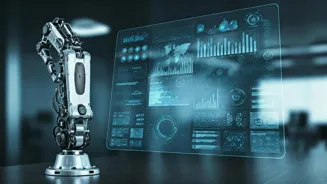AI's Impact on Roles
The decision made by Accenture underscores the critical role of Artificial Intelligence (AI) in the modern professional environment. The company's strategic
direction pivots around the necessity for employees to possess the capacity to adapt and excel in an AI-integrated workplace. Those lacking these essential skills face potential displacement, while individuals who embrace upskilling and reskilling initiatives will enhance their career prospects. Accenture's proactive stance sets a precedent, signifying that the ability to leverage AI technologies is no longer a mere advantage, but a fundamental requirement for professional survival and advancement. This shift impacts professionals across all levels and disciplines, emphasizing that staying relevant in today’s job market means staying updated on AI advancements.
Upskilling and Reskilling Focus
Accenture's approach is centered around extensive upskilling and reskilling programs. They are investing substantial resources to equip employees with the necessary AI competencies. This investment encompasses a variety of training opportunities, from foundational courses to advanced specializations, designed to equip employees with the tools and knowledge needed to thrive. By prioritizing continuous learning, Accenture aims to create a workforce capable of integrating AI seamlessly into its operations. This investment is a strategic move aimed at both retaining talent and improving employee skills, which will ultimately bolster the company's competitiveness. The company’s proactive strategy reflects the evolving business landscape that is ever more dependent on AI technologies.
Adapting to Change
The changes implemented by Accenture reflect the wider shift occurring in the industry. The company's actions act as a signal to employees that adaptability is highly valued. Employees are encouraged to embrace continuous learning and develop an understanding of how AI and other emerging technologies influence their roles and the work processes within the company. Those who show a willingness to learn new skills and adapt will have more opportunities. However, employees who are resistant to change and don't show a willingness to learn risk being left behind. This strategy aligns with the overall aim of preparing the company to succeed in a quickly changing technological landscape.
Industry-Wide Implications
The strategy undertaken by Accenture is also expected to impact the wider industry. Accenture's bold approach to upskilling and implementing an AI-first strategy can shape the approach of other companies. Companies are now seeing the crucial need to invest in workforce skills to integrate AI successfully. This shift also highlights the significance of talent acquisition in the AI realm, causing businesses to seek professionals who already possess expertise in AI and related fields. This shift will likely prompt a more proactive approach to human capital management in the tech sector and beyond, where the integration of AI is already underway. The outcome may see a broader shift towards specialized training and a focus on continuous learning to keep employees competitive in the long run.






















